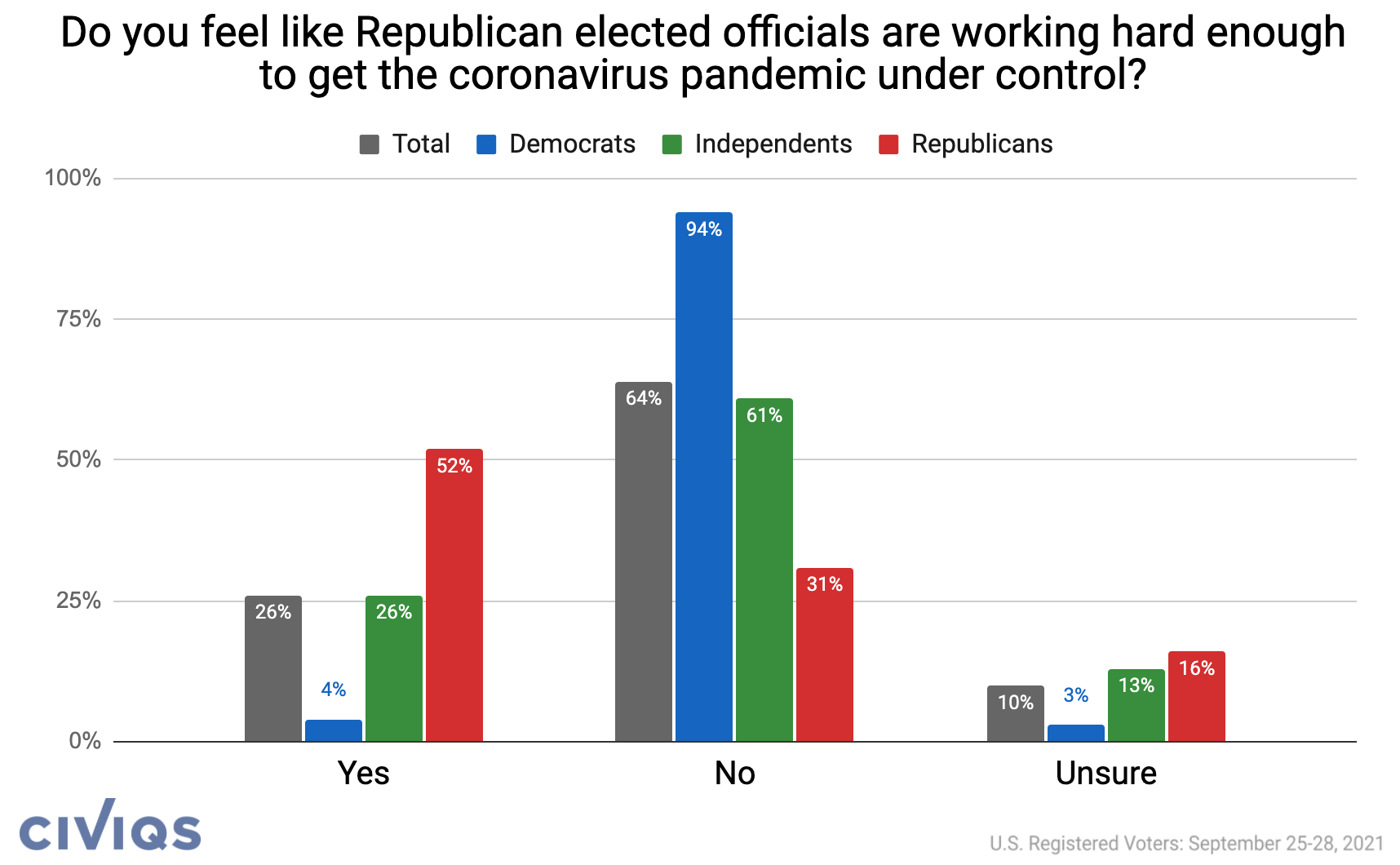Report: Americans Say Republican Elected Officials are not Working Hard Enough to Control the Pandemic
The September 2021 Daily Kos/Civiqs Poll asked 1,213 registered voters in the United States about the coronavirus pandemic, the U.S. Supreme Court, student loan debt, voting rights, and more.
Government Response to COVID-19
Since the emergence of the COVID-19 Delta variant this summer, Americans have grown increasingly dissatisfied with the U.S. government’s response to the pandemic. Americans generally feel that President Biden is working hard enough to get the coronavirus pandemic under control, with 48% saying he is doing enough, versus 41% saying he is not. Americans are slightly more divided over whether Democratic elected officials as a whole are working hard enough to control the pandemic, with 44% saying yes, 44% no, and 12% unsure.

In contrast, a large majority (64%) of Americans say that Republican elected officials are not working hard enough to get the pandemic under control. Even one in three Republican voters (31%) say that Republican officials are not doing enough. Independent voters agree with this assessment by an over 2-to-1 margin: 61% of Independents feel that Republican officials are not working hard enough to control the pandemic. A bare majority (52%) of Republicans say that their own party’s leaders are working hard enough on the pandemic response.
COVID-19 Vaccination
With many Americans still unvaccinated against COVID-19, the survey asked voters how they perceive people who have not yet received the vaccine. Americans are sharply polarized. Half (49%) say that if someone has not taken the vaccine, “it is their choice, they are free to do what they think is best for themselves.” The other half (47%) believe that not taking the vaccine “is an irresponsible choice that puts themselves and their communities at risk.” By party, 86% of Democrats call it an irresponsible choice, while 86% of Republicans take the opposite view.
Recent news reports have discussed the possibility that doctors and hospitals might take a patient's COVID-19 vaccination status into consideration when prioritizing who to treat. A majority (57%) of Americans say that vaccination status should not be part of this decision. However, 35% of Americans, including 61% of Democrats, feel that COVID-19 vaccination status should be considered when making decisions about allocation of healthcare.
The Supreme Court
Most Americans currently believe that the U.S. Supreme Court has become too partisan and is not generally fair. A majority (57%) of Americans—including 80% of Democrats and 53% of Independents—feel that the Supreme Court is too partisan. Although the Supreme Court has become more conservative in recent years, 34% of Republican voters believe that the court is too partisan. Just 52% of Republicans say that the court is generally fair. In total, fewer than one in three Americans (30%) think that the Supreme Court is generally fair.
Americans do not want the Supreme Court to overturn its Roe vs. Wade decision concerning abortion. Led by 88% of Democrats, 57% of Americans overall want the Supreme Court to uphold Roe vs. Wade. Nearly one in four Republican voters (22%) also want Roe vs. Wade upheld. Only 29% of Americans believe that the Supreme Court should overturn Roe vs. Wade.
Student Loan Debt Repayment
There is broad support for the Biden Administration to forgive up to $50,000 in federal student loan debt for every borrower. A majority (52%) of voters would like the Biden Administration to forgive either $10,000 in debt (14%), or as much as $50,000 in debt (38%). Two in three Democrats (66%) say that Biden should forgive $50,000 in debt, but this position is only shared by 33% of Independents and 9% of Republicans.
Americans are divided over whether student loan debt repayments, which have been paused in response to the COVID-19 pandemic, should be resumed after January 2022. Slightly more voters (46%) would like the pause to be extended further, then resumed after the current extension expires (45%). Support for extending the repayment pause is higher among young voters under age 34 (51%) than among older voters over age 65 (40%).
Civiqs surveyed 1,213 registered voters in the United States from September 25-28, 2021. The survey was conducted online, among selected members of the Civiqs research panel. Sampled individuals were emailed by Civiqs and responded using a personalized link to the survey at civiqs.com. The survey results are weighted by age, race, gender, education, party identification, and region to be representative of the population of registered voters in the United States. The general design effect due to weighting is 1.05. The survey has a margin of error of ±2.9% at the 95% confidence level, accounting for the design effect.
Download the survey methodology and crosstabs
Interested in conducting a survey? Speak with a Civiqs Analyst.
Want Civiqs updates in your inbox? Sign up for our newsletter, Immediate Reaction.